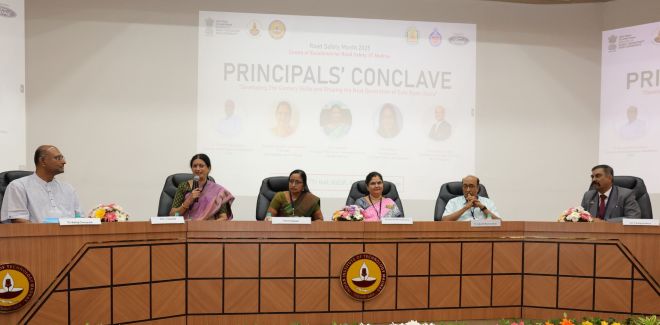Indian Institute of Technology Madras’ (IIT Madras) Centre of Excellence for Road Safety (CoERS) conducted a ‘Principals’ Conclave’ as part of its ‘Training Young Minds Project’ to bring together heads of reputable educational institutions to discuss and deliberate on road safety education in India.
India currently has the highest number of road crashes and fatalities in the world. Crash data from 2022 published by the Union Ministry of Road Transport and Highways (MoRTH) attributes that nearly 60% of fatalities took place on 5% of the roads (National and State Highways) in India.
The working age group of 18 to 60 accounts for 83.4% of total road crash fatalities in the country, which has serious implications on the emotional and psychological impact on family and society at large and imposes significant socioeconomic costs on the nation.
A panel discussion on ‘Developing 21st Century Skills and Shaping the Next Generation of Safe Road Users’ was also conducted during the Conclave. The discussion involved Principals of leading schools deliberating on introducing road safety into curriculum, the role of students in road safety and technology-enabled systems towards implementing activity-based learning.
The key takeaways from the conclave are:
- Alignment of schools towards activity-based learning in road safety
- Exchange of ideas towards education for adolescent children
- Capacity building of teachers towards implementation of road safety programmes
Elaborating on the on the programme, Prof. Venkatesh Balasubramanian, Head, CoERS and RBG Labs, IIT Madras, who is leading this initiative, said, “We believe that driving etiquette and safe driving practices has to be nurtured in our future generation. This behavioural nudge happens best when a child is in an impressionable age and is mentored by their teachers in school. By training the young minds a skill as part of an activity is bound to be retained by the child. Our scientifically designed process can go a long way in creating impact that will have lasting effects in reducing accidents and fatalities on our roads.”
Delivering the opening address, Prof. V. Kamakoti, Director, IIT Madras, said, “As a youthful nation, our population is our strength and each fatality has severe socio-economic costs to both families and the nation, which is immeasurable. At IIT Madras, we are extremely happy to support such a noble initiative and feel that schools must take it forward, with larger schools mentoring others. This is not a one person-journey but a team effort and we will support any initiative that looks at making societal change.”
Addressing the event, Shri Shunchonngam Jatak Chiru, IAS, Principal Secretary, Transport and Road Safety Commissioner, Government of Tamil Nadu, said, “Over 1.68 lakh people lost their lives in India in 2022. In Tamil Nadu, that number was 17,884, which translates to 49 fatalities a day. This deeply affects the society and we need to look at the reasons behind it. In the time of social media influencers, we must remember that teachers remain the most important influencers for young children. This Conclave must be a call-to-action and each of us must resolve to enable and equip young minds with the required skills to practice safe driving.”
The Centre of Excellence for Road Safety (CoERS) has been working training of master trainers (teachers, traffic warden and road safety patrol students) on activity-based learning (ABL) of road safety. A memorandum of understanding towards this was signed with Ford in August 2024.
Taking the dais, Shri R Sudhakar, IPS, Additional Commissioner of Police (Traffic), Greater Chennai Traffic Police, said,” Young minds can be moulded easily and as we get older, it becomes difficult to impart certain values. If we take small steps to incorporate traffic sense and road safety at the school level, we can definitely witness a change. Our driving behaviour is a result of how we are taught to drive, and just like we can only score in our exams by being firm in the basics, we need to be taught the basics of driving such as rules and signages well.”
Addressing the gathering, Shri Srikanth Ramanathan, Director, Global Business Operations, Ford, said,” At Ford, we are proud to be associated with this venture, to help the community. If road safety is taught to school students, especially in the age group between 12 and 18, it will reduce the number of juvenile accidents and turn them into responsible road users when they become adults. Children are socially aware of what happens on the road and using activity-based learning to teach important concepts will help them come together and prepare better for the future.”
Inculcating road safety practices at a young age is vital as it helps embed these habits into long-term memory, making them a natural part of their lifestyle. By teaching road safety early, the society can ensure that safe behaviour becomes second nature, which could lead to fewer loss of lives on roads.
Towards this objective, this program focuses on practical training, emphasizing responsible driving on the roads. These trained individuals will impart further training programs in their respective schools and traffic jurisdictions creating multiplier effects in driving practices, traffic rules, and hazard awareness.
By investing in the education of young drivers, CoERS aims to reduce accidents and create a safer future for all road users. Under the programme, the use of practical methods such as puzzles, crosswords, skits, and painting, ensures that a more lasting impact is left on the minds of young participants. This ‘gamification’ of the process ensure that road safety is viewed with interest by participants.
Since the inception of the Training Young Minds project in 2024, the Centre has trained over 850 trainers across more than 320 schools with more than 2,400 students being impacted, at a pan-India level.
These Master Trainers who would in turn act as Influencers for young drivers were trained in activity-oriented road safety modules to impart further training to students and young minds. The comprehensive module covered traffic rules, road signs, vulnerable users, and driver behaviour. The capacity building programmes have used interactive training methods focusing on ABL to make the lessons effective.














